English Words in Action, Group D
(a variety of English words which have developed through history and are currently used in our modern age)
Simply click on this banner (or the following link) and you will be on your way to stimulate your brain for greater word comprehension with quizzes based on some of the words in this unit.
2. To conceive of plans that emphasize the productive integration and reuse of waste landscapes throughout the urban world: Landscape architects and city designers like to drosscape as a challenge to use existing conditions which others have condemned as unusable.
3. Etymology: a conception that dross, or "waste", is scaped, or "resurfaced", and reconstructed for the benefit of human existence.
2. A prolonged absence of something which is specified: Karl ended a five-game hitting drought as a professional baseball player.
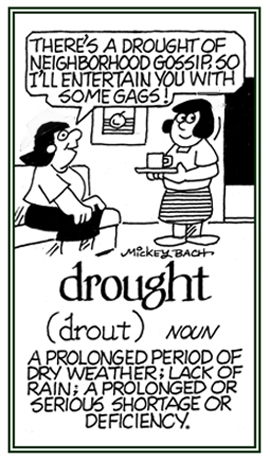
Go to this Word A Day Revisited Index
so you can see more of Mickey Bach's cartoons.
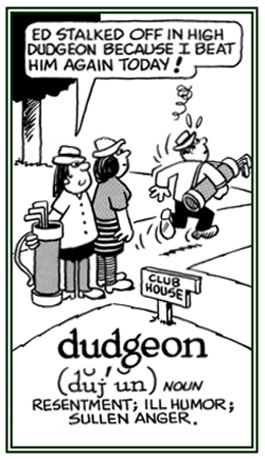
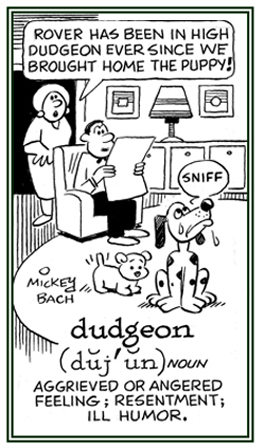
Go to this Word A Day Revisited Index
so you can see more of Mickey Bach's cartoons.
2. Lacking responsiveness or alertness; insensitive: Ray's dull response to the shattering news in the newspaper was unexpected.
3. Dispirited; depressed: Compared to other patients at the mental health clinic, Debora has a dull feeling.
4. Not brisk nor rapid; sluggish: Janine did not get a good night’s sleep last night and so she feels as if her brains are dull this morning.
5. Not having a sharp edge or point; blunt; such as, a dull knife: The knife was old and the blade was dull and not good for chopping vegetables.
6. Not intensely or keenly felt: Jacob has a dull headache today that simply won't go away.
7. Arousing no interest or curiosity; boring: It was a dull TV program.
8. A reference to a color; such as, a plain brown which is neither bright nor vivid: Helena's paintings were characterized by her use of dull colors with an occasional bright highlight.
9. Cloudy or overcast: Norbert looked out the window and saw a dull sky.
10. Not clear or resonant: Latonya heard a dull thud from the apartment above when someone up there dropped something.
11. Etymology: originally meant "slow-witted" and was borrowed from Middle Low German dul, and was a descendant of the prehistoric Germanic adjective dulaz.
It is recorded as having come from Middle English dulle, dull; from Old English dyl, a parallel form of Old English dol, "foolish, presumptuous", and related to Old English dwellan, "to lead astray".
"Special earplugs dulled the sound of the chain saw."
2. To make something; such as, a feeling less sharp, not as strong, or reduces severity: "The medication dulled her mind and hampered her thinking skills; however, it was also dulling her pain." 3. To become or to cause something; such as, a knife or blade to become less sharp: "This knife has been dulled because of so much usage."2. People who are regarded as mentally incompetent; that is, unintelligent or slow to comprehend: "Some people are beginning to think that the country is being run by too many political dullards."
2. A lack of visual brightness: It was so foggy in the afternoon that the dullness got to Debora and she felt that she needed a cup of tea to lift her spirits.
3. That which lacks interest: The speaker’s topic had such a dullness about it that many in the audience got up and left early.
4. A condition or situation that results in being slow to understand or to recognize something: The dullness of the old dog was accentuated by its inability to recognize its owners when they came home.
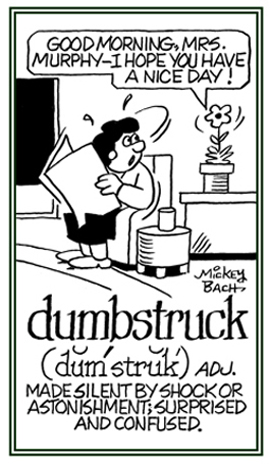
Go to this Word A Day Revisited Index
so you can see more of Mickey Bach's cartoons.
2. To bewilder or to confuse: The bill from the cabinet maker completely dumfounded Jack because it was twice as high as he had expected!
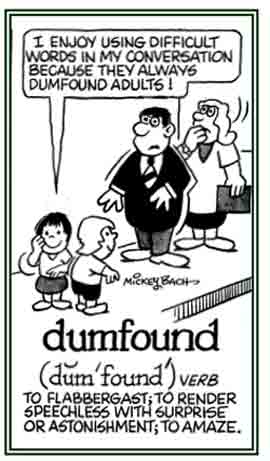
Go to this Word A Day Revisited Index
so you can see more of Mickey Bach's cartoons.

Go to this Word A Day Revisited Index
so you can see more of Mickey Bach's cartoons.
A towering cloud of Gobi Desert sand dwarfed the rows of houses as it descended on a small village in central China while the residents hid inside their homes with their windows and doors locked shut as the desert dust swept through the region advancing 70 feet a minute.
2. The small particles of dirt that settle on surfaces in buildings; including, houses, public buildings, industrial areas, etc.: The housekeeper was unable to keep up with the dust that drifted in from the local highway construction.3. The small particles that something, especially a human body, is thought to be reduced to by decay after death: After cremation, Jennifer's remains were just particles of dust.
4. The earth, particularly that of someone's grave (a literary term): Many authors have referred to the grave or an individual buried in a grave as the dust of the earth.
5. Etymology: form Old English, "dust", from German Dunst, "mist, vapor". The meaning of "that to which living matter decays" was in Old English; hence, figuratively, "mortal life".
When Christa comes back from the beach, she always dusts the sand off her legs before she goes into her house.
2. To cover something with a fine powder: The police dusted the table and chairs for fingerprints.William's mother usually dusts the cake with powdered sugar.
The farmer is dusting his crops with a pesticide.
3. Etymology: from about 1200, "to rise as dust"; later it came to mean both "to sprinkle with dust" and "to rid of dust". The meaning, "to kill" is a U.S. slang term that was first recorded 1938; such as, "he was known to bite the dust as a result of the auto accident".Links to all of the groups of English words in action, Groups A to Z.
You may see the bibliographic list of sources of information for these words in action.


